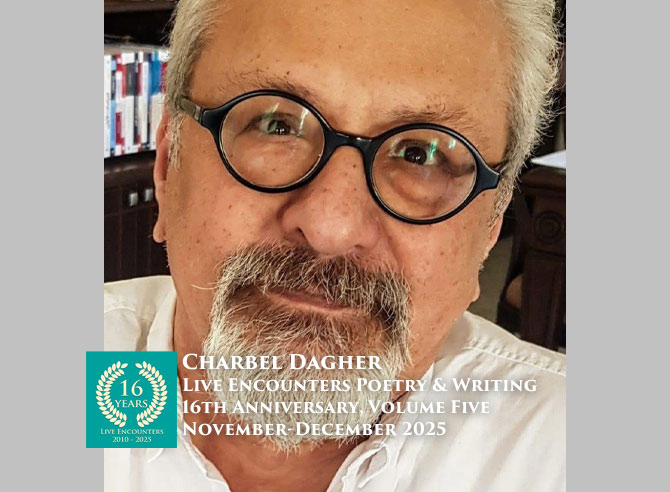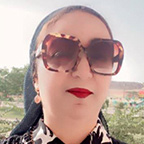
Live Encounters Arab Poetry & Writing 16th Anniversary Volume Five
November- December 2025
The poem contemplates the river, poems by Charbel Dagher.
Translated from Arabic by Dr. Salwa Gouda.
The poem contemplates the river
The river, with all it carries
Grows weary of those settled, those staring blankly in the emptiness of trees Stripped of their fruit
It recedes without vanishing, it babbles without a single sentence
It does not keep pace with the bird in its flight
But it lightens itself of the prey of folly, falling of their own accord.
In the river, there is a river that remembers, in its course, that it was a river before
it could gulp down glasses of waiting
In the river, there is more of what rose high, of what appeared to the onlooker on
The benches of the bank
More that overflows from its drinkers, from those bathing in it, from those wading Into its depths, tirelessly
It overflows without a shudder in its body
And forgets the voices of those wandering in its calculated maze
Perhaps it is other than what we think
Other than what flows between its facing trees
Perhaps it is a whiteness in motion, a stammer without the awkwardness
Of those sitting before a school board.
Perhaps the passing years forget the river that was, which in its silence, remembers A single cloud that accompanied it without a word or reproach on the afternoon it Laid out the fruits of its vine for a feast hidden from the eyes of those who Survived the flood.
The river races the poem, surpasses it without mercy, even though the poem
caresses it, and dances with it without a rhythm.
The poem contemplates the river, hoping it will carry it along, in its gentle sway, in Its delectable depths, in its long flow.
Perhaps the river that has passed
Is other than the one yawning in the shade of the poem.
My poem went off searching for me
No boats
So why do I hurry to raise sails for what floats in its leisurely course between
Two clouds?
No air follows air
To straighten my panting stumble between two rocks
Between two feet
From where would I get the means to correct my river if it sank into its solitude
if it stammered in its walking?
Is what remains for me to let it float according to the air’s inclinations, following What tempts
And seduces in the possibilities of the void?
O you who carry me, push me, race me, without a wave
Are you the one who woke me from the peril of wonder?
Are you my restless bed, and my carpet without departure?
Is my rushing descent among the trees, my postponed abyss or the field for
strolling?
No known course
Only this channel
Between what I crash into and what receives me with its lightness
Only this coming and going with no aims other than the descent descending in its Falling.
This broken branch, it is me
This gentle undulation without tuning, it is me
This being that I am, has not enough time to contemplate what it is falling into.
This being that I was, exchanges no speech with me, after it lay down on the bank
Of the poem: it tosses me from one possibility to another, while my life went off
Searching for me to no avail, in that strait
Without boats
Or sails.
Why don’t you reclaim me?
O river flowing freely in its descent,
Why don’t you return?
Why don’t you reclaim me?
Why don’t you go back to what was scattered in the open, without pity?
Why – if only for a gaunt second – don’t you resume improvising the oud in its Plucks, so I can prolong a sigh that widens from my throat
And a gasp purer than my breath?
Why are you other than what I am
Devoid of my slipper’s step, as it realizes its exit from the dream’s mire
And from the viscosity of the boy who plunged into it with all his might searching
for his perforated coins?
Why are you other than me, without reproach or sorrow
Like the insolence of the days that spread out before me, like the wetness of water
On my fingers:
It dries up the moment it emerges from the depth of the attempt?
© Charbel Dagher
Charbel Dagher (b. 1950), a Lebanese professor at the University of Balamand, is a prominent Arab cultural figure renowned as a bilingual (Arabic/French) poet, writer, novelist, translator, journalist, and scholar specializing in Arabic language, Arabic poetry, and Arab/Islamic aesthetics. Holding dual PhDs, he has collaborated internationally with universities in France, Italy, Malta, and Tunisia. Dagher has published extensively, including numerous poetry collections, novels, and influential scholarly works on Arabic calligraphy, Islamic art history, and modernity in Arabic poetry and language. He has organized major cultural conferences, held key positions like Secretary General of the Arab African Cultural Forum, chaired international art juries (e.g., Sharjah Biennial), and served as coordinator for Léopold Sédar Senghor’s international acknowledgment. His poetry has been translated into several languages and inspired visual art and theatre, while he has also translated significant works of French and African poetry into Arabic. Recently, his poetry book “The River Bathes in Its Own Prose” won the Abu al-Qasim al-Shabi Prize for Poetry.
 Dr Salwa Gouda is an accomplished Egyptian literary translator, critic, and academic affiliated with the English Language and Literature Department at Ain Shams University. Holding a PhD in English literature and criticism, Dr. Gouda pursued her education at both Ain Shams University and California State University, San Bernardino. She has authored several academic works, including Lectures in English Poetry and Introduction to Modern Literary Criticism, among others. Dr. Gouda also played a significant role in translating The Arab Encyclopedia for Pioneers, a comprehensive project featuring poets, philosophers, historians, and literary figures, conducted under the auspices of UNESCO. Recently, her poetry translations have been featured in a poetry anthology published by Alien Buddha Press in Arizona, USA. Her work has also appeared in numerous international literary magazines, further solidifying her contributions to the field of literary translation and criticism.
Dr Salwa Gouda is an accomplished Egyptian literary translator, critic, and academic affiliated with the English Language and Literature Department at Ain Shams University. Holding a PhD in English literature and criticism, Dr. Gouda pursued her education at both Ain Shams University and California State University, San Bernardino. She has authored several academic works, including Lectures in English Poetry and Introduction to Modern Literary Criticism, among others. Dr. Gouda also played a significant role in translating The Arab Encyclopedia for Pioneers, a comprehensive project featuring poets, philosophers, historians, and literary figures, conducted under the auspices of UNESCO. Recently, her poetry translations have been featured in a poetry anthology published by Alien Buddha Press in Arizona, USA. Her work has also appeared in numerous international literary magazines, further solidifying her contributions to the field of literary translation and criticism.

